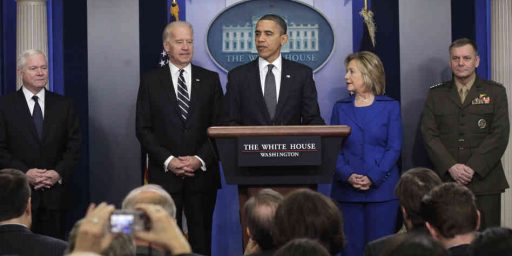Gates Retreat and Political Reality
The editors of the Wall Street Journal are confused:
There’s a rumor going around that Robert Gates is the Secretary of Defense. We’d like to request official confirmation, because based on recent evidence the man running the Pentagon is Democratic Senator Carl Levin of Michigan. For that matter, is George W. Bush still President?
The cause for this consternation is last week’s announcement that General Peter Pace will not be renominated as Joint Chiefs chairman in order to avoid a contentious battle in the Senate.
Mr. Gates seems to think he can succeed as the anti-Rumsfeld by appeasing the likes of Mr. Levin, but his kowtow only makes Mr. Bush look weaker as a Commander in Chief who can’t even select his own war generals.
That’s probably true. Then again, he can’t select his own generals. Not by himself. We have this little thing called “separation of powers” and “checks and balances.” For those of you who missed that day in Civics class, here’s a refresher.
Article II of the Constitution provides that, “The President shall be commander in chief of the Army and Navy of the United States, and of the militia of the several states, when called into the actual service of the United States” and that “he shall nominate, and by and with the advice and consent of the Senate, shall appoint . . . officers of the United States, whose appointments are not herein otherwise provided for, and which shall be established by law: but the Congress may by law vest the appointment of such inferior officers, as they think proper, in the President alone, in the courts of law, or in the heads of departments.”
Even when listing these presidential powers, the Framers made it clear that most of the authority derived from Congress. Further, Article I assigned Congress all manner of powers over military affairs. Aside from declaring war, the legislature was empowered “To raise and support armies;” “provide and maintain a navy;” “make rules for the government and regulation of the land and naval forces;” “provide for organizing, arming, and disciplining, the militia, and for governing such part of them as may be employed in the service of the United States.”
The fact that Pace is widely considered a Yes man and might well not survive Senate scrutiny is a perfectly valid reason to decide against renominating him. Unpopular presidents leading unpopular wars have less ability to ram appointments through Congress, especially when the opposition party has taken control of that institution. That’s not turning the system on its head; that is the system.
On the other hand, the boys at WSJ have a point here:
The irony is that Mr. Pace is less responsible for our Iraq troubles than is General George Casey, who Mr. Gates was happy to support for Army Chief of Staff this year despite similar Democratic threats.
That’s one I can’t explain. Casey’s tenure in Iraq was, by all accounts, an unmitigated disaster. His nomination for a promotion is simply baffling.





That’s one I can’t explain. Casey’s tenure in Iraq was, by all accounts, an unmitigated disaster. His nomination for a promotion is simply baffling.
I’m afraid that the Casey nod says more about Gates than does his action on Pace, who likely would’ve faced a rocky hearing for (relatively) peripheral reasons — his remarks on gays, his letter pleading for Libby.
OTOH, it may just be that there’s so much more of a consensus that Iraq is FUBAR, so that Gates fears that even the pusillanimous Dems won’t fear to raise a ruckus.
Indeed, it takes the intellectual and moral bankruptcy of the WSJ Editorial Board to hear about someone not being sent to Congress for a confirmation hearing because it’s not clear the individual’s record and public statements will pass muster before a body of duly elected representatives of the voting public – and call it a Bad Thing.